Technology is in the air– this might sound funny to you, but it is a fact, from your kitchen to your workplace, technology is everywhere- the best example is the smartphones that you carry all time with you.
Just like the popular saying goes “Necessity is the mother of Invention”– undoubtedly the current digital era is the result of it and the best example of it is in the health sector.
Healthcare services are becoming more like a movement rather than a trend. Considering the fast-paced advancement and digitalization in technology, the health sector is no exception.
In just a few years from manual healthcare services, to the blockchain, big data, precision in medicine, regenerative medicine, and advanced artificial intelligence, the health sector has come a long way. These improvements only highlight the fact that the healthcare system has no plan of slowing down anytime soon.
In this article, I am particularly going to talk about the Hospital Management System (HMS). This revolutionary system, if I say is no less than a miracle or a dream come true then it would be wrong. But, before we further explore the world of Hospital management systems, let’s have a look at what is HMS and why it is the current need.
Table of Contents
What is Hospital Management Software/System?
One of the building blocks of the Hospital Management Information System (HMIS) is Hospital Management Software or commonly known as Hospital Management System (HMS). HMIS is a system designed for data collection to support the planning, management, and decision-making in healthcare facilities and other health organizations.
The Hospital Management System is a part of HMIS. It is one of the integrated healthcare software in the Health sector that allows hospitals and clinics to automate their workflow.
The personalized HMS customized option for your healthcare facility helps in the smooth management of healthcare services along with the medical, administrative, financial, and legal aspects. The Hospital Database Management System covers all these services allowing the hospitals and clinics to unify and simplify the practice of the doctors as well as providing patients with seamless healthcare facilities.
The HMS helps you in achieving a successful operation of your healthcare organization and facility.
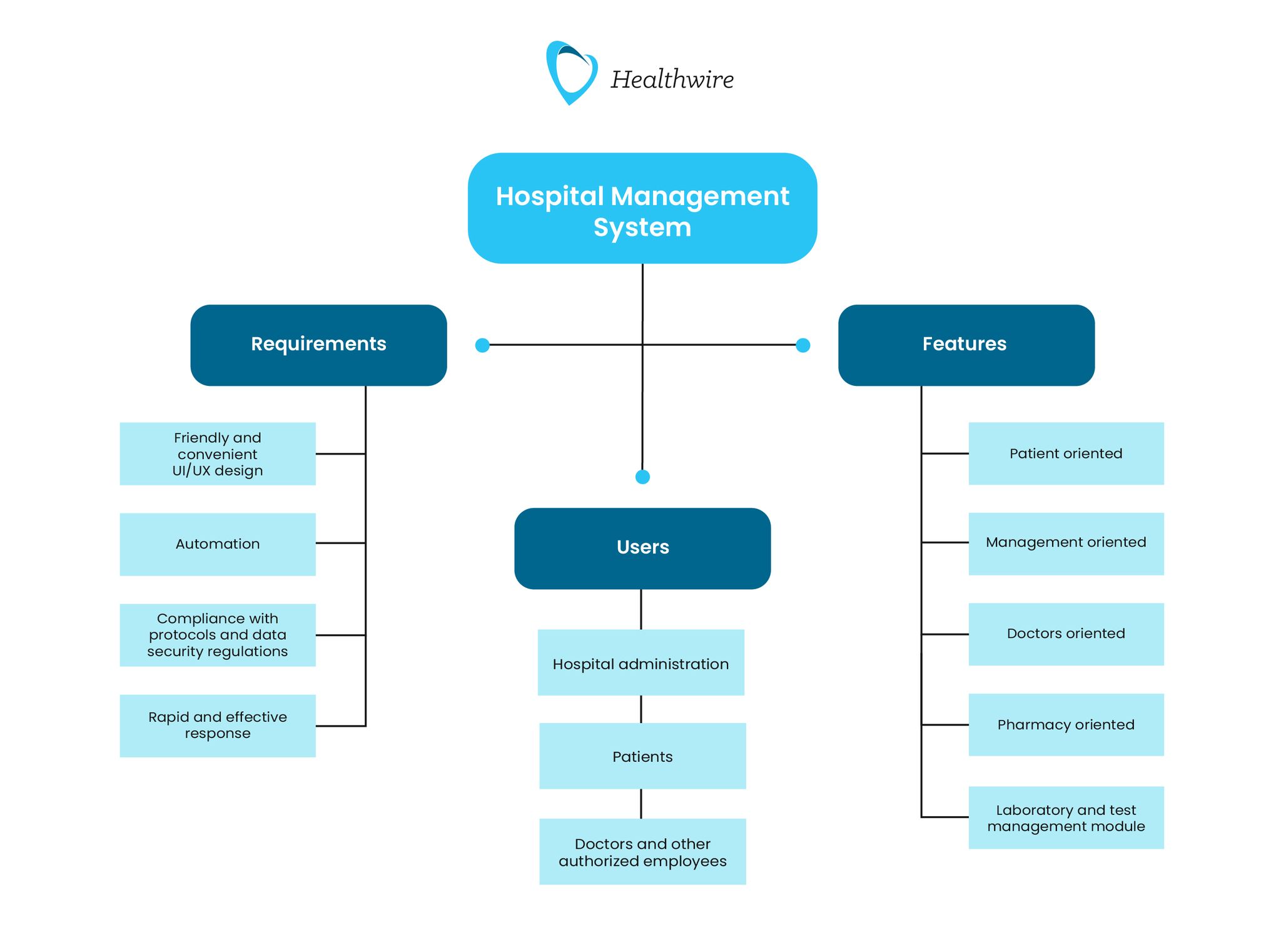
Why is there a Need for a Hospital Management System in Pakistan?
The health sector has always remained a neglected aspect in Pakistan. The number of patients is more as compared to healthcare providers. This gap affects the healthcare services given to the patients when each thing is done manually.
When a patient visits a hospital, the medical and paramedical staff have to put more effort to treat the patient. Therefore, considering the limited resources, a limited number of healthcare providers, a large population, and fast-paced digitalization, a hospital management system in Pakistan is much needed.
To provide services timely and to reduce the manual work from patient appointments and billing, Hospital Management Software is necessary.
We are quite aware of the fact that to manage the work in a hospital, we need an assistant. For example, to keep a check on what the management team is doing, information update on the handlers, which cases and patients the doctors are handling, how paramedics are helping medical doctors, how the accounts and finance department is the working-in fact the whole hospital practices needs to be checked and monitored.
Considering all these challenges Healthwire Hospital Management System is a comprehensive hospital software that helps you manage your healthcare facility.
How is it a Complete Package?
It is a complete package, with a set of protocols having complete information, on all the aspects that are necessary to run a hospital or any health facility. It starts to work from the time a patient enters a hospital, adding their credentials, tracking health history, health records, and billing. Moreover, it just doesn’t end here- it moves to the pharmacy and inventory, to keep a check on the records and manage the stocks.
Now, if you are thinking about the accounts then both locally and globally it assists you in its best form. You have all the information in your hand no matter where you are and can even manage multiple branches.
Not only this, but Healthwire also has specific software such as Practice Management Software, Laboratory Management Software, Pharmacy Management Software, Corporate Wellness Programs, etc.
Now before we go into the details of the features and benefits of HMS, let’s have a look at the history of the HMS.
Background of the Hospital Management System Software
If you are thinking that Hospital Management System Software is a new technology, let me tell you that it can be comparatively low but not that new.
Developed countries such as Japan, the USA, and other European countries started to work in HMS in the early 1960s. But, it was until the 1970s that many of the large hospitals started to have their own HMS and practice management system.
It was until 2000, that more customized and advanced Hospital Software started to develop. The main aim at that time was to connect various healthcare facilities within the countries to develop an integrated health system.
WHO’s HealthCare FrameWork and HMIS
Some of the major health rules and legislations around the world are checked by the WHO. The framework of the health system WHO is instrumental in the strengthening of the health system overall. It can also be used as a catalyst to achieve health targets globally.
“The Hospital Information Management System (HMIS) is way more financially stable, reliable, efficient, fast and versatile as compared to the other disease-specific health systems”.
Various studies have further revealed that the smart hospital management system helps in assessing healthcare services and performance in the country. HMIS and HMS subsequently can interact with the other health systems and health reforms in the country.
Due to this reason, WHO 2016, reformed from the “Millennium Development Goals (MDGs)” to the “Sustainable Development Goals (SDGs)” for their global health program. It was such a remarkable initiative for the HMIS to improve the quality of healthcare. These new goals would ultimately shape the health system. The inculcation of the Hospital Management System is one thing, but how our country, or any country works towards achieving these targets is another issue.
Now let’s move on with the detailed analysis of the Hospital Management System Software
Target Audience and Market for Best Hospital Management System Software
For any smart hospital management system, it is important to know all the pros and cons, especially the target market. Developers need to completely comprehend the users, future functions and particularly supposed benefits so that they can create a convenient, efficient, and versatile HMS.
Once they understand this step, only then they can plan, direct their efforts, opt for the most suitable technologies, foresee the potential problems, and finally can come up with the best solutions.
The Hospital Management System Software, just like its name is a complex software suite of unique interconnected program modules that can provide both management and information facilities to versatile users.
There are mainly three types of best hospital management software, which are:
- Administration of the Hospital
- Doctors and other authorized employees
- Patients
In the HMS, there are various rules and regulations for the category. All these restrictions depend on the role of the user and it also varies depending upon the administration in case they want to limit any information. You can take the example of this that a doctor can have access to the medical records of his/her patients but not of other patients.
There is a unique identifier for each user that is linked with the other person’s rank in that system. It should also be noted here that the user that has a higher position, has more permission and access within the system. This would also mean that they would be needing more authorization.
This authorization may include a certain password, a keycard, a USB dongle, a face or finger scan, or voice authorization.
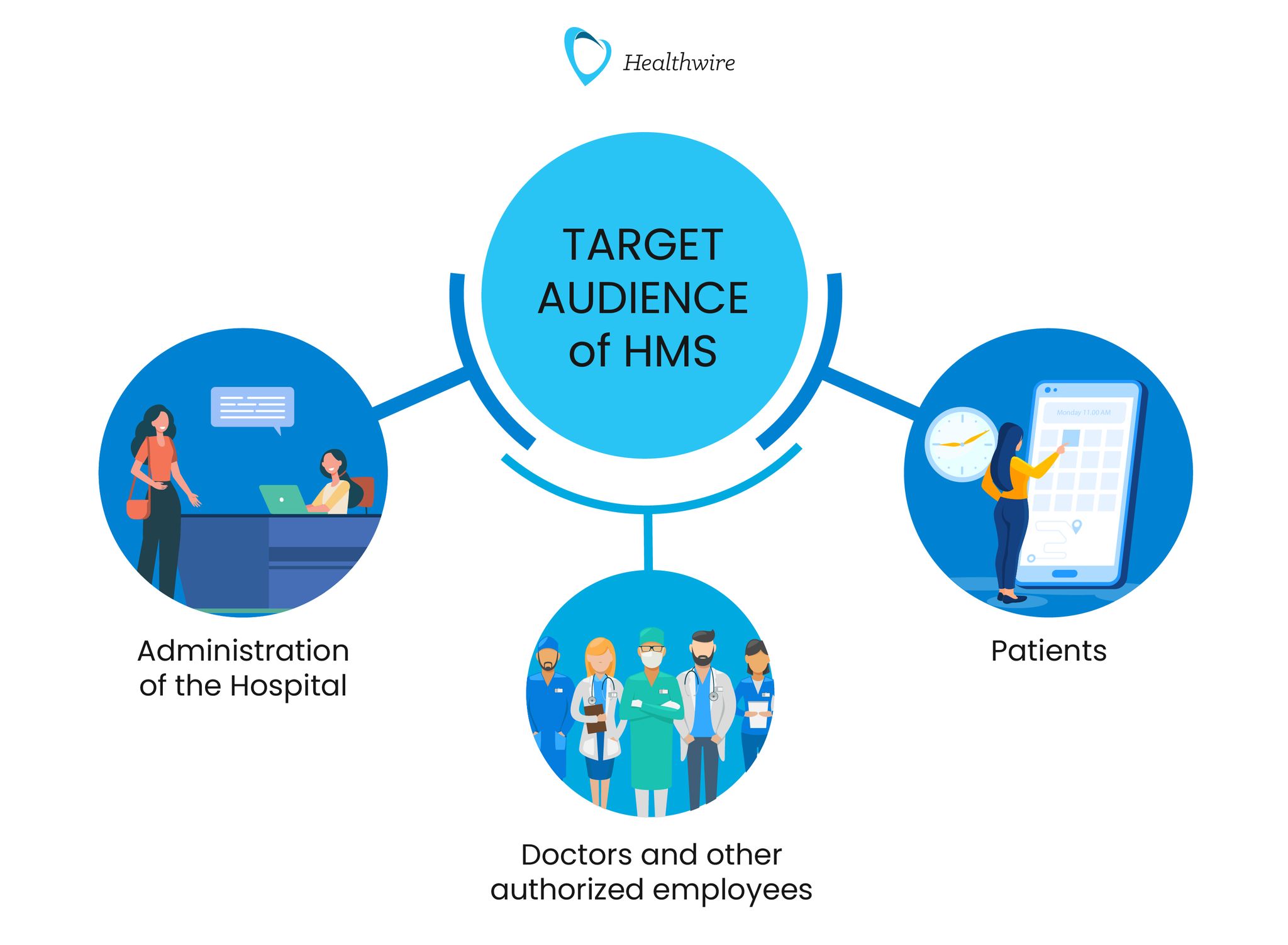
Hospital Management System Types and Their Purpose
The best hospital management system is divided into 4 types which are:
1. Medical Management System
This type particularly is for particular healthcare facilities. It includes an emergency management system, outpatient, medical record management, blood bank management system, and medical statistical system
2. Administration Management System
This type of hospital database management system includes the personnel management system, logistics management system, emergency management system, financial management system, medical equipment management system, drug store management system, outpatient, surgery, and hospitalization of patient management system.
3. Various Auxiliary Systems
This type of hospital management system includes medical database systems and medical information retrieval systems.
4. Decision Support System
This type includes medical database systems and medical information retrieval systems
The main research frontier of the hospital information system and hospital management system is by using engineering systems and cybernetics. These are necessary to develop medical quality control systems and quality assessment systems. All of this can be achieved using various computer-based applications.
Now, let’s have a deeper look at the Medical Quality Evaluation System
Medical Quality Evaluation System
The components included in the medical quality evaluation system are:
1. Evaluation of the Medical Quality
This medical quality is comprehensively evaluated using different cases and parameters such as medical outcomes, diagnosis compliance rate, medical error rate, average medical expenses, and average hospitalization days.
2. Quality of the Nursing Staff Evaluation
In this mathematical models are created and then processed using computers to have a final evaluation. It is done based on operational technology, basic nursing, psychological care, filling out the farms of the nursing, ward management, implementation of the rules and regulations, etc.
3. Evaluation of the Efficiency of Hospital Work
Here again, mathematical models are created using detailed evaluation methods and then calculated by a fuzzy matrix. The key parameters used in these evaluations are the average bed workday, average bed turnover number, actual bed occupancy rate, and average hospitalization days of the patients. All these parameters are used to outline the weights and then create a detailed evaluation index to check the efficiency of the work.
Systems Similar to the Hospital Management System
Other systems are similar to the Hospital Management System which are:
- Medical Library Management System Database Design
- Hospital Pharmacy Management System
- Telehealth System Platform
- Telemedicine System Platform
- e-Health Platform
- Telehealth System Platform
- Telecare System Platform
Basic Requirements for the Hospital Management System Software
As we have discussed above, hospital management software is a complex process and for this particular reason, it has many requirements for HMS.
There are 4 basic requirements for any smart hospital management system which are:
1. Convenient and friendly UI/UX Design
One of the top requirements of such a medical management system is a convenient and friendly UX/UI design. This is extremely important as it affects the number of potential users. The patients and medical staff both need to have a convenient and informative system, which is effective and easy to use by everyone regardless of age group or computer skills.
2. Automation
The HMS needs to have the ability to collect, process, store, and output a large volume of information in a variety of forms. Hence, automation is important to handle this huge data to incorporate different types of documentation in hospitals such as the medical history of the patient, documents of clinical trials, insurance, and complaints.
Not only this, the system needs to be compatible with different types of media information: for example, digital images, video, computed tomography results, recorded operations, and 2D and 3D scans.
3. Compliance with the Protocols and all the Data Security Regulations
Confidentiality and limited access to the data are some of the basic requirements of the Hospital Management System. Ensuring the safety of the data of patients and confidential documents of the hospital is also one of the top priorities of any best hospital management system.
If there is any leak of the information, any loss or corruption in the data, the outcome can be more devastating. Due to this, hospitals may face lawsuits and financial loss and even the hospital may have to close down.
4. Rapid and Efficient Response
In the field of medicine, time is everything. Hence, fast and rapid response is everything. For this very reason, the hospital software should be rapid enough so that in case of emergency, it allows fast registration and fast relevant data retrieval. The data is included in the history of the patient from the archives of the system or the database of other hospitals.
Specified requirements, functions, and customization determine the choice of technology and tools to be used to develop smart hospital management software. Only experienced specialists can choose an appropriate technique to achieve a high speed, solid functionality, and positive user experience-based Hospital management system.
Keeping this in mind, the team Healthwire has successfully created one of the best hospital management systems in Pakistan. You can feel free to browse and have a demo.
Components and Features of Health Management System Software
When any healthcare facility is opting for hospital management software then it becomes essential to learn to devise a comprehensive hospital management system.
Setting priorities and planning becomes one of the most important aspects of its development. These steps outline the components, functions, uses, and advantages that the healthcare facility or hospital expects to achieve at its final stage.
Keeping this in mind the developer and the whole team of Healthwire suggest a list of recommendations, modules, and customization. They make sure that the efficient and effective administration of your healthcare facility is achieved.
Here are some major components of Healthwire’s Hospital Management Software. As per the client’s demand, the number might vary but usually, most of the HMS modules are the same.
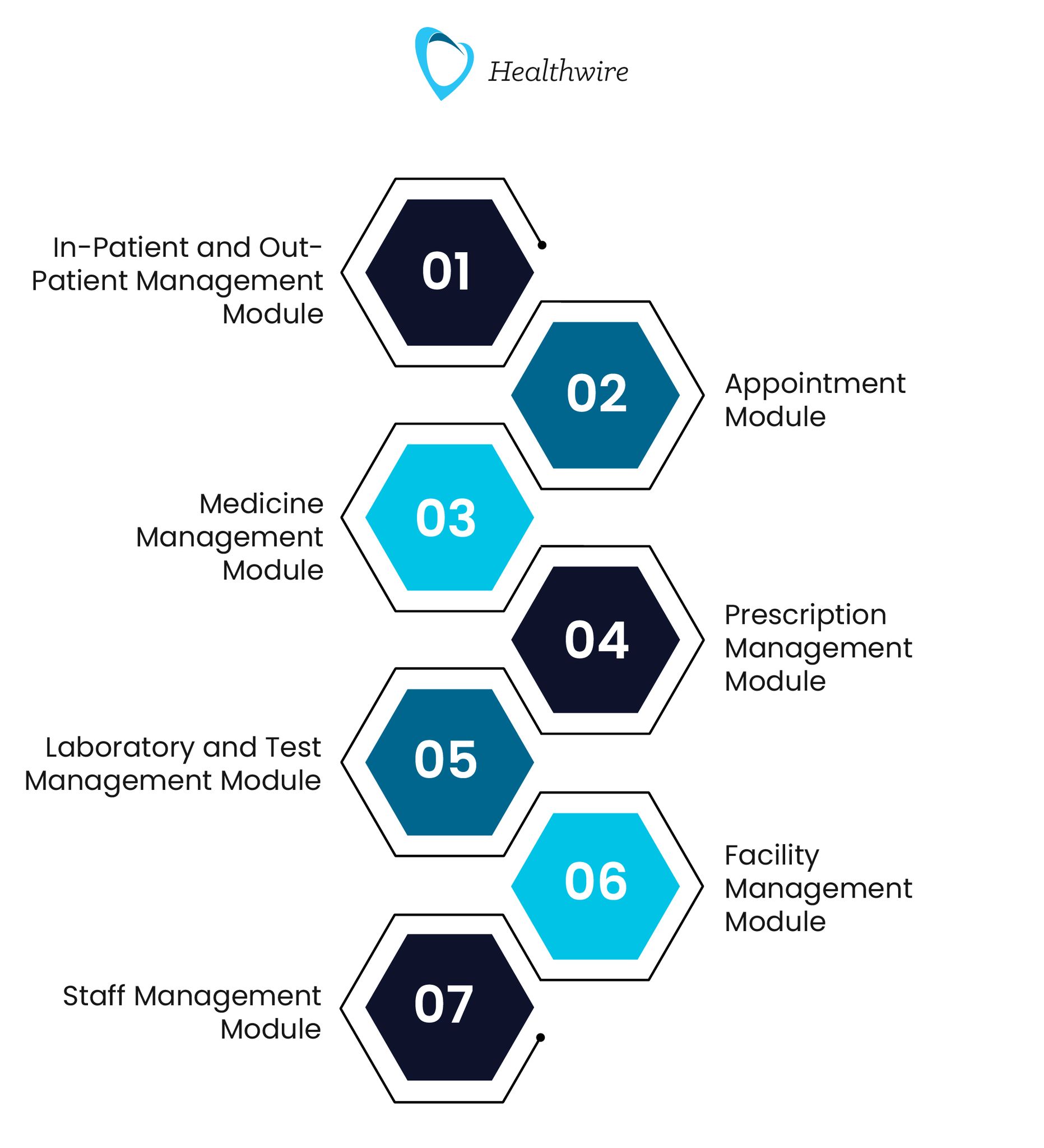
1. In-Patient and Out-Patient Management Module
This module is one of the pillars of HMS. It keeps a check on the patient flow. It is used to register patients, add and check their medical health records, and view medical reports and the treatment they are undergoing.
2. Appointment Module
This module in the hospital management system helps in arranging and managing the schedule of the doctors according to the applications of the patients. It helps management in organizing a convenient time for the doctors as per their availability. This also helps the hospital in providing remote medical assistance when they need immediate medical help.
3. Medicine Management Module
It keeps a record of the drug used for the treatment of each patient. It also contains a list of the medicine that is used for specific treatment.
4. Prescription Management Module
In this, the most common and recently used medicines are used. In this, the medicines available in the pharmacy are also checked and the prescription is directly changed into the order.
5. Laboratory and Test Management Module
This module contains the complete diagnostic test details and the test results of the patients. This data is both generated for the patient for their medical report and can be viewed by staff and doctors.
To achieve an overall better functionality of the HMS, the laboratory management system module is integrated with the other hospital information system modules.
6. Facility Management Module
In this module, the management can track and maintain the availability of the room, the status of occupancy, and other versatile kinds of documentation of administration.
7. Staff Management Module
This module helps the administration of HR. It tracks the records of recruiting, and the job description of the employees, and updates the structure of the hospital.
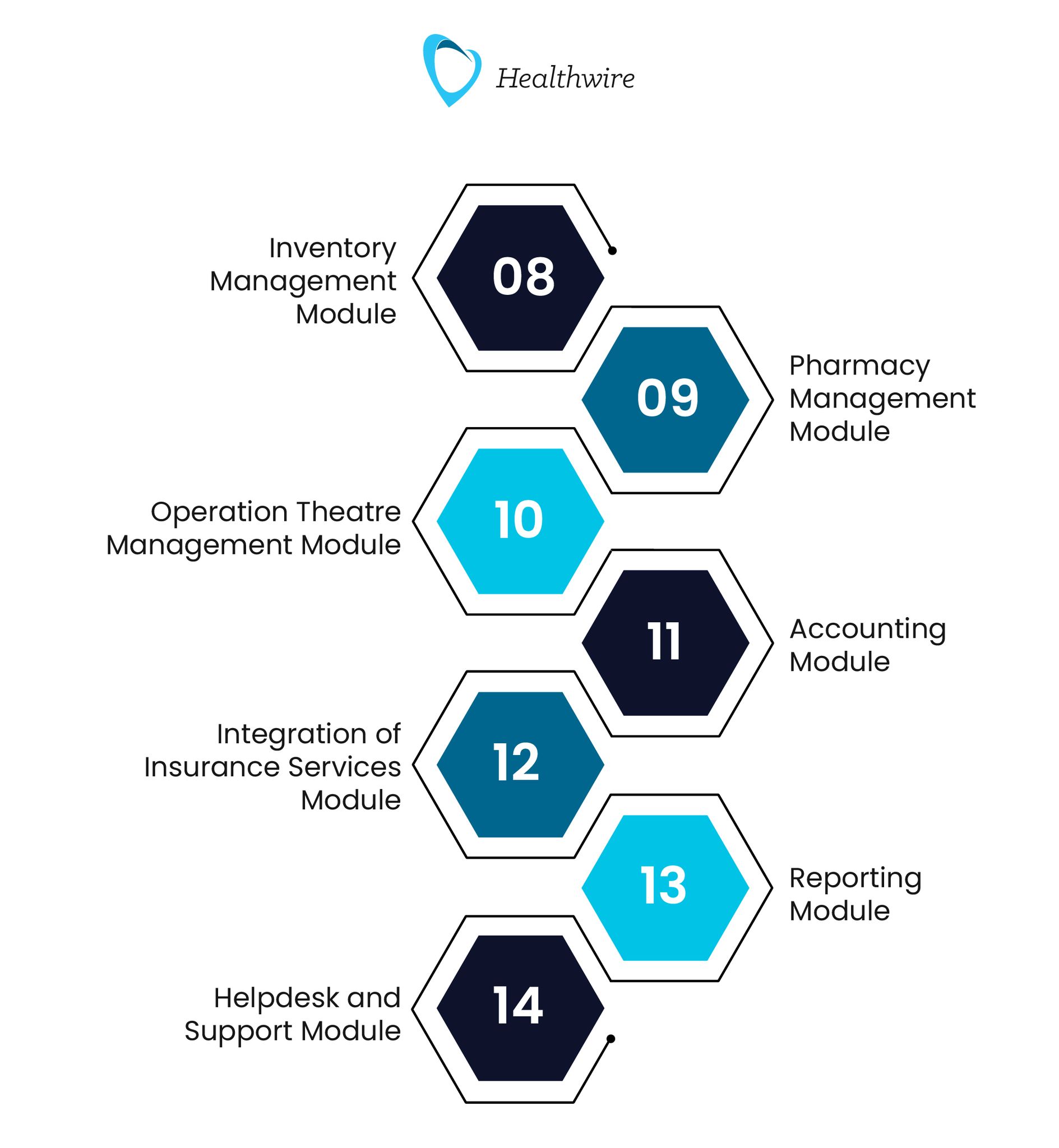
8. Inventory Management Module
The inventory of the clinic or hospital is controlled by this module. Due to its convenience, the entire supply chain is automated.
9. Pharmacy Management Module
In this module of the online hospital management system, complete comprehensive management of the pharmacy is done. From the integration of the prescription to the stock handling, ward request and complete reports everything related to the pharmacy is under this module.
10. Operation Theatre Management Module
In this module of the hospital management system, the complete set of operation theatre protocols is integrated.
11. Accounting Module
This module deals with both the medical institution and patients’ financial affairs. It keeps a check on all kinds of patient-related payment details, expenses of the hospital’s financial record, and profit.
12. Integration of Insurance Services Module
This module helps in integrating the insurance details of the patients. It contains the policy information of the insurance, the insurance company, and the policy number.
13. Reporting Module
It contains detailed information. This is an essential module that helps the management to collect, analyze and check the performance data in a detailed comprehensive format. This system helps in defining the problematic aspects and then successfully eliminating them to achieve higher satisfaction of customers and profitability.
14. Helpdesk and Support Module
This module helps in specializing in different problems, issues, and requests. It makes sure that operations are properly maintained, the data needs to be valid and then reported accordingly.
What are the Benefits of Choosing a Hospital Management System?
We have discussed in detail the hospital management software, so it becomes more necessary why in the current era we need an HMS system. Here are some of the benefits of a hospital management system:
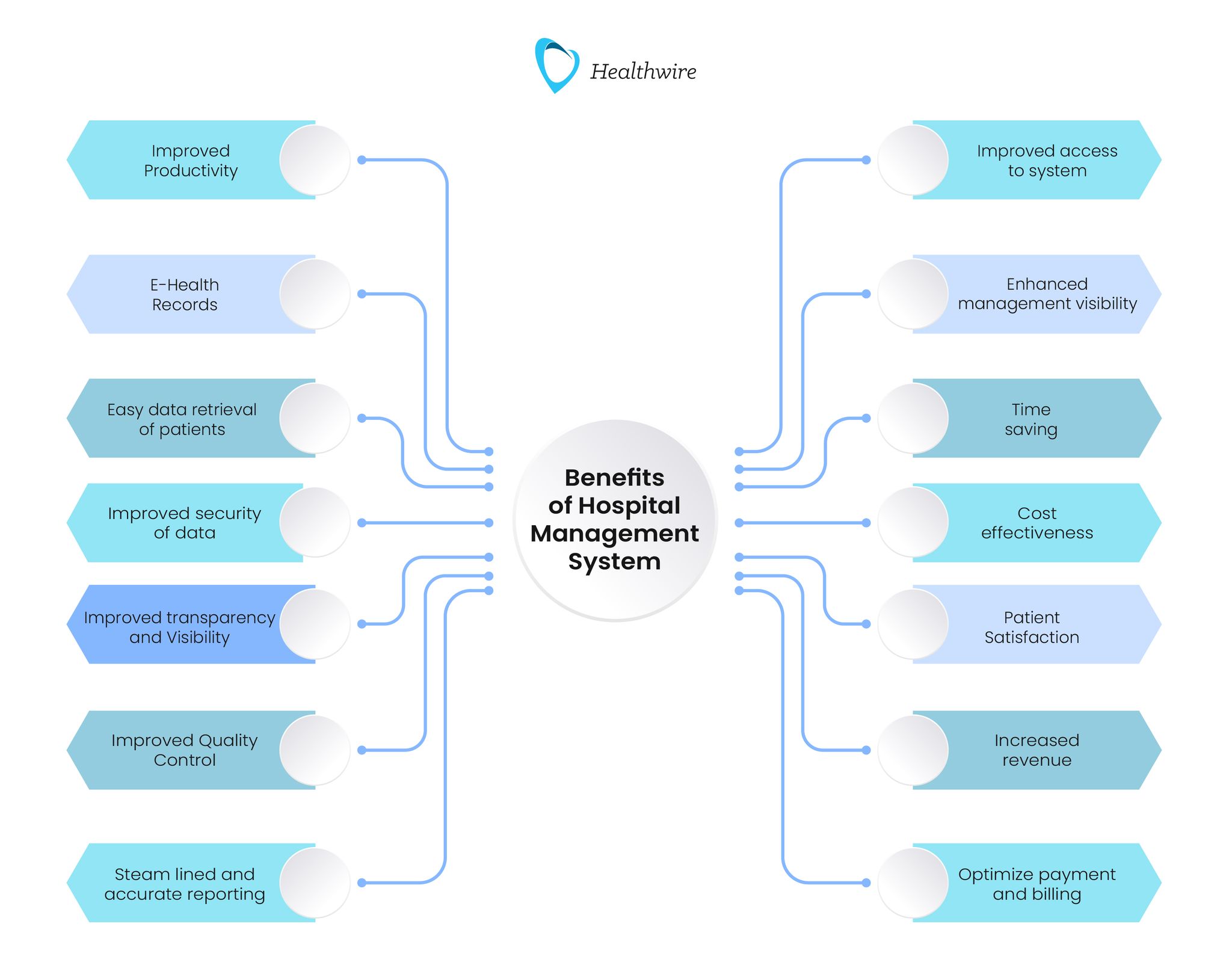
- Easy Data Retrieval of Patients
HMS makes data retrieval of patients more simple and available in just a few clicks. Data such as the medical history of the patient, current illness, doctors treating the patient, lab test reports, information on bills, and many others can easily be checked by the user/patients. All this data would help in the proper diagnosis of the disease of the patients.
- E-Health Records
Complete patient e-health records can be viewed from E-health records. The information can be retrieved based on the medical number, the patient’s name, or the record number of the physician/medical specialist.
- Improved Security of Data
The security of the data is increased by the secure HMS system. Only authorized and limited individuals can have access. With the use of hospital management software, the data is stored on the cloud or server and is safe by merely getting the login information safe.
- Improved Transparency and Visibility
Transparency and visibility are improved in the complete management system of the hospital.
- Improved Quality Control
Hospital Management System Software improves and increases the quality control of the services and product of the hospital.
- Streamlined and Accurate Reporting
The reporting becomes more streamlined and accurate with the help of accurate and updated records using the health management system.
- Improved Access to the System Facilities
The hospital management system simplifies the process of accessing the system facilities. It only allows authorized users to have access thus keeping it safe from unauthorized users
- Enhanced Management Visibility
The management visibility of the complete information, hospital, and extensive data regarding the doctor, patient, and medicine can be checked easily by any department.
- Time-Saving and Cost Effectiveness
The hospital management system not only saves time but is equally cost-effective. If you are thinking about how it is cost-effective then it decreases the number of people working manually on the paperwork and data entry. The amount of human intervention and error is decreased by the implementation of the hospital management system. Every hospital has a different requirement and as per the need, the customization is done.
- Patient Satisfaction
The HMS provides patient satisfaction as the doctor can check the reports of the patients anytime without any delay. The patients don’t have to wait for hours to book their appointment.
- Increased Revenues
The HMS helps the healthcare facility in increasing revenue as it reduces the manual work, reduces the expenses on staff and even it allows more time for the doctors to check their patients.
- 24/7 Server Support Service
You can get your queries sorted out with the help of our 24/7 server support service. Real-time errors are checked and sorted timely
- Free Staff Training
The training of staff for the hospital management staff is free and there are no hidden charges for that.
Ending Note from Healthwire!
Without a doubt, the changing trends and advancements bring hope for an exciting change. The change may not always be accepted. But, in healthcare especially considering Pakistan, with the increasing population and fewer doctors embracing modern health is necessary.
To improve the quality of health and medical services, opting for hospital management software or any other healthcare software is necessary to keep familiar with the developments in the health sector. The better we are equipped, the better we can work together to improve healthcare practices and provide a seamless ecosystem of health for all.
